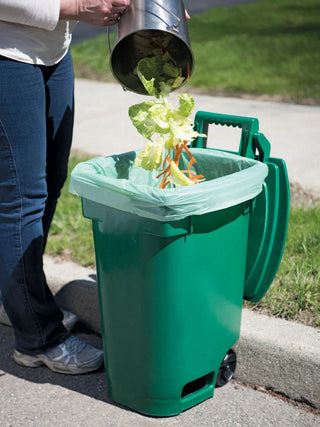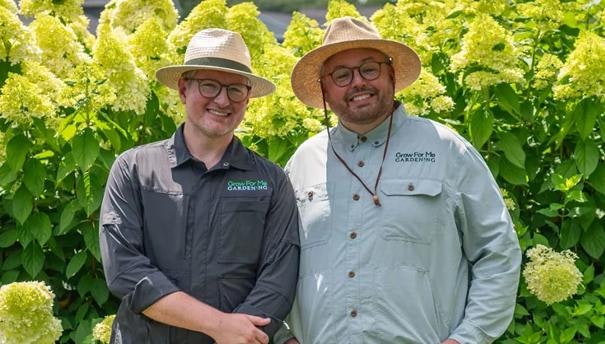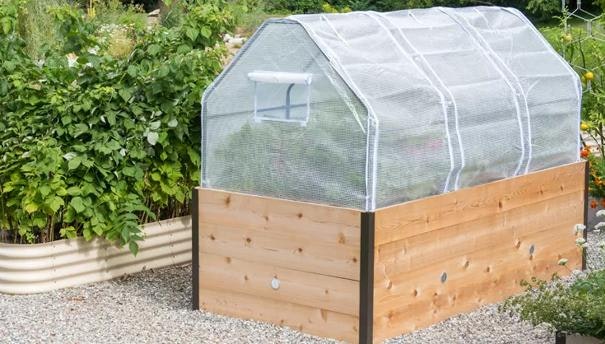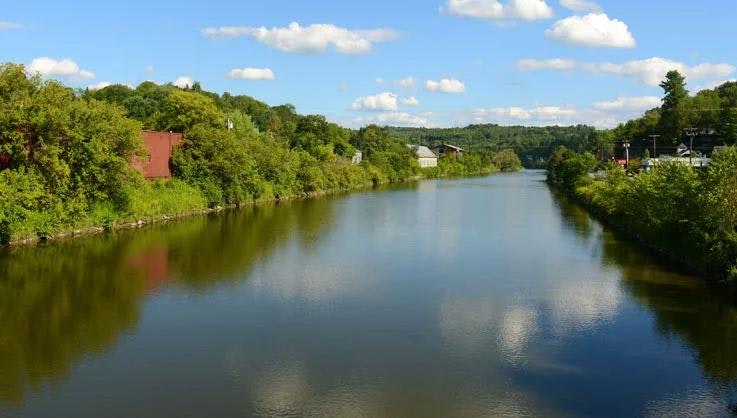With the increase in recycling and reuse programs, it's easier than ever to reduce the amount of trash in our garbage cans. But we can do a lot more.
"We have become a throw-away culture," says Jen Baer, sales and production coordinator for Green Mountain Compost (GMC) in Williston, VT, "Despite the fact that composting was practiced by our ancestors for generations, most people have moved away from that common-sense practice."
In northern Vermont, Chittenden Solid Waste District (CSWD) estimates that a single household could divert 300 pounds or more per year of food scraps and compostable paper from landfills through home composting. The U.S. Environmental Protection Agency (EPA) estimates each American throws away 1.3 pounds of food waste daily. These items — along with yard waste — make up 20 to 30 percent of the U.S. waste stream, according to the EPA.
"Meat, bones, soiled paper items like paper towels, tissues, paper plates and cups, oily pizza boxes, tea bags, coffee grounds and filters, sauces, dairy products all of these items are compostable at drop-off centers, and some are OK for backyard composting, too," says Baer. "Just imagine how much waste that could cut out!"
"When we consider that about a third of waste produced by most households is comprised of organic material, you can see how composting can make a difference on many fronts," Baer says. "From an environmental perspective, reducing the amount of waste that goes to the landfill results in significantly lower emissions of greenhouse gases (from landfills), less fuel used for trucking, and less landfill space needed. By composting, we're turning what would otherwise end up completely wasted into a valuable, nutrient-rich soil resource."
 Years ago, we set up our bathrooms at Gardener's Supply with one bin for paper towels and another — much smaller — for trash. It's been a big success.
Years ago, we set up our bathrooms at Gardener's Supply with one bin for paper towels and another — much smaller — for trash. It's been a big success.Beyond the Backyard
Many people can accommodate a backyard bin or pile for a lot of their compostable material. It's a great place for weeds, grass clippings and other yard waste. Every year, backyard composters divert vast quantities of organic waste from landfills. But the backyard set-up can't handle everything. For instance, if meat, dairy products and leftover food are placed in a typical backyard bin, these items might attract animals. What's more, home compost systems don't get hot enough to break down all types of food waste.
To get more materials out of the waste stream, you have to go beyond the backyard, Baer says. "There are two kinds of home composting that we encourage. One is at-home composting, where people collect material at home and then compost it in their yards. The second option is drop-off composting, where people collect materials at home and drop them off [at a municipal processing facility]," she says.
Many municipalities have large-scale operations that can handle items (meat, dairy) and amounts (25 bags of autumn leaves) that won't fit into a home compost pile or bin. And the compost they create can be used in public areas, donated or sold to gardeners.
 CompostNow
CompostNowAt-Home Composting: No Backyard Required
The backyard is just the beginning. More and more municipalities and private companies are integrating composting as a waste-reduction strategy in their communities—particularly in urban areas, where residents don't have typical backyard spaces.
CompostNow, based in Raleigh, NC, provides doorstep pick-up of compostable materials for a monthly fee. The company got its start when founder Matt Rostetter was challenged to recycle food waste in his apartment. "My 'aha' moment came from thinking about how convenient, easy and popular doorstep produce delivery seemed," Rostetter says. "I thought, 'Why can't it go both ways?'"
City-dwellers in the CompostNow service area fill their CompostNow bins weekly—with the general guideline of "If it grows, it goes"—and earn a half-pound of composted soil for each pound of scraps they divert from the landfill. "For those that don't have a need for the soil, they can choose to give it to a local community garden partner of their choice," says CompostNow's Justin Senkbell.
He adds, "Not everybody has the ideal set-up to compost at their home. CompostNow wants to empower those people to still be able to divert food scraps from the landfill and keep those valuable nutrients in the community."
Any household, anywhere, can compost with just a small amount of planning … and there are plenty of resources to help people get started or to take their composting to the next level.
"Part of what we do is make home composting as easy for people as possible," says Baer. "Every living situation is different. Finding the right system for your situation is important. Be realistic about what you can handle. … Make sure that everyone in your household understands why it's important to compost and what can and can't be composted."
Climate doesn't have to be an issue. "Small, at-home compost piles will freeze and stop composting during the winter months, but it's still okay to continue to add to piles," says Baer. "Once the warmer weather resumes, the pile will once again start composting and shrink down." She adds that drop-off composting services, such as GMC and CSWD, accept food scraps and yard clippings year-round.
Lesser-known compostables
 This sign on the compost bin reminds cooks what items can be composted at the drop-off site.
This sign on the compost bin reminds cooks what items can be composted at the drop-off site.Even people with years of composting experience are often surprised to learn about some of the items on the list below. For a larger list, take a look at earth911.com
Keep in mind: Whatever goes into the compost pile ultimately reaches the soil, so steer clear of material that's had contact with pesticides or chemicals. If in doubt, leave it out.
Fireplace ashes: Ashes from untreated wood can be sprinkled on the compost pile occasionally, in very small amounts. Wood chips, in tiny fragments, are also compostable if they haven't been dyed.
Coffee grounds and paper tea bags: The remains of a daily cup of coffee can also be a "perk" to the compost pile. Some serious composters even collect extra grounds from area coffee shops. For tea bags, remove staples.
Paper: Newspaper, printer paper, wrapping paper … as long as it's clean, it can be composted. Tear it into pieces and toss it on the pile. The smaller the pieces, the faster the process.






